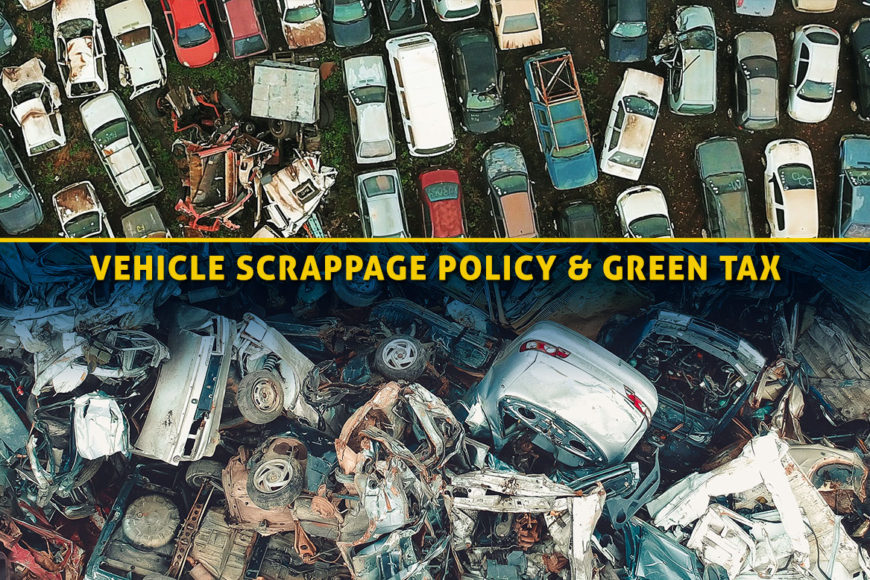- February 4, 2021
- By admin
- In News
- Tags Green Tax, Scrappage Policy
- 1951
- 1

Govt of India has announced a vehicle scrappage policy which will come into effect from 1 st April 2022. What does this scrappage policy mean to various types of customers?
First, let’s look at what this policy entails.
As per the Ministry of Road Transport and Highways (MoRTH), the scrappage policy, for now, is applicable only to central and state government-owned vehicles. All such vehicles that are 15 years or older will be scrapped.
This will benefit the Indian auto industry as governments both state and central are big customers of the OEMs. Additionally, since these 15-year-old vehicles use older generation IC engines that do not have stricter emission control systems, they end up polluting considerably. So scrapping of such vehicles and replacing those with new Bharat Stage-6 engine vehicles will also result in reducing air pollution.
For private and commercial vehicles the scrappage policy is on a voluntary basis for now. The private and commercial vehicles above 20 and 15 years respectively will undergo a fitness test at government-appointed automated vehicle fitness centres. And if they fail the test then will have to be scrapped.
A “Green Tax” is also being proposed at the time of renewal of the registration certificate. Under this proposal, a private vehicle will have to pay a considerable amount of Green Tax at the time of registration certificate renewal after 15 years. This could be as high as 50% of the road tax value. A commercial vehicle that is older than 8 years will be charged a Green Tax that could be 10-25% of the road tax at every renewal of the fitness certificate.
Environment-friendly vehicles like hybrids, electrics, and alternative fuel vehicles will be exempted from such tax. The idea behind a Green Tax is to encourage people to scrap their very old vehicles and purchase the new ones which are designed to reduce the tailpipe emissions considerably and are more compliant to various safety norms as well. As per the Centre for Science and Environment (CSE), by 2025 India will have nearly 2 crore old vehicles that will be near the end of their lives.
A study conducted by IIT-Bombay in 2014 suggested that pre-2005 vehicles contribute more than 70% to the total vehicular pollution. That is a significant number.
Just for the sake of comparison, an old Bharat stage-1 diesel engine will emit 35 times higher particulate matter than an equally sized Bharat Stage – 6 diesel engine. So it will be a huge boost to improve the air quality in our country with the implementation of this scrappage policy.
So the scrappage policy has multiple objectives –
The scrappage policy has obvious benefits but there must be a prudent exception put in place for vintage, classic, and modern classic cars as they are an important part of automotive history. Such vehicles aren’t used daily and are kept in the best possible shape and are very well maintained. Preserving such automobile history is also crucial.
Overall I feel if rightly implemented the vehicle scrappage policy has nothing but only benefits for our nation.



1 COMMENT
Niraj Agarwal
February 6, 2021, 3:32 pm REPLYWhile I was reading the article, had a question in mind what about Vintage Classics which also you covered in your last section of the article. Great piece of info and very easy to understand explanation. Keep it up Rohit. Thanks for sharing!!